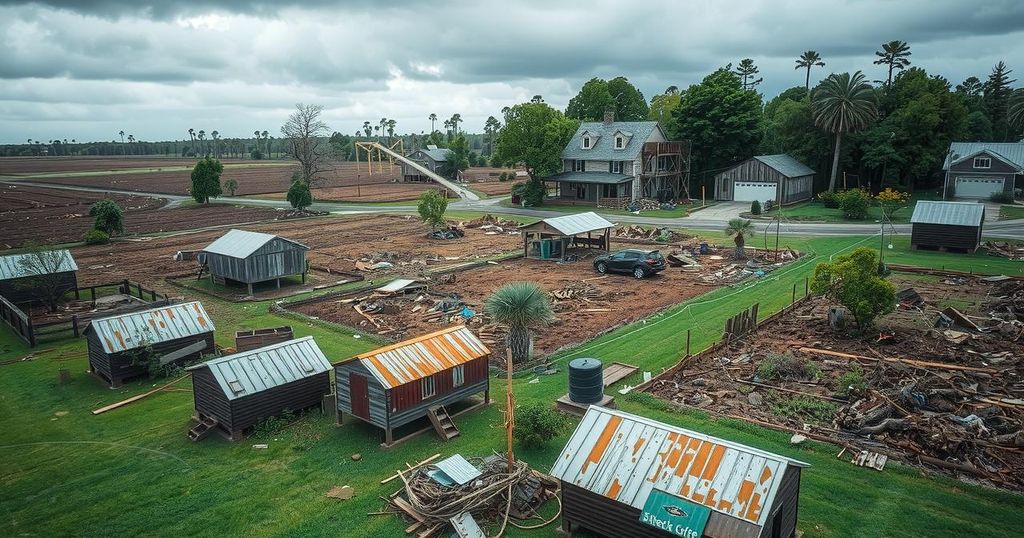Agricultural Devastation: The Impact of Hurricane Helene on Southern Farmers
Hurricane Helene has devastated agricultural production in the South, especially for cotton and poultry farmers, leading to an estimated $10 billion in losses. Farmers are struggling with cleanup and recovery, facing emotional and financial burdens while awaiting state and federal disaster aid.
Farmers are grappling with the aftermath of Hurricane Helene, which devastated their crops across the Southern United States. The hurricane made landfall in Florida on September 26 as a powerful Category 4 storm, subsequently causing significant damage in Georgia and adjoining states. Over two months later, Chris Hopkins, a farmer in Toombs County, Georgia, continues to confront the emotional and economic toll of the storm as he surveys the mangled remains of his irrigation systems and crumpled grain bins.
Hopkins estimates he lost a substantial portion of his cotton crop, with 50% of the harvestable lint falling to the ground due to the storm’s timing. Despite having insurance, his losses amount to approximately $430,000, not including the costs of removing debris and repairing machinery. The overall economic impact of Hurricane Helene across the Southern agricultural sector may surpass $10 billion, affecting various crops and livestock farms.
In Virginia, South Carolina, and Florida, economic analyses indicate losses of $630 million, $452 million, and $162 million, respectively. Farmers are facing the daunting task of recovery while dealing with a market that was already experiencing low prices for cotton, necessitating high yields for profitability. Some agricultural producers have expressed despair over their situation, contemplating whether to rebuild or abandon their livelihoods.
State and federal responses to this agricultural disaster are underway. Georgia’s government has allocated $100 million for emergency loans, but direct financial assistance to farmers is restricted by state law. At the federal level, discussions are ongoing about disaster aid for affected farmers. As the rebuilding process begins, many hope for timely assistance to recover their operations and livelihoods.
Hurricane Helene, a significant natural disaster, made landfall in September 2024, wreaking havoc across the Southern United States, particularly in agricultural regions. Characterized as one of the deadliest hurricanes in nearly two decades, it resulted not only in loss of life but also extensive economic damage to farms and agribusinesses. Crop losses, uprooted timber, destroyed equipment, and livestock casualties highlight the severity of the impact on the agricultural industry. Farmers are facing a compounded crisis of emotional and financial instability as they navigate recovery efforts amidst low market prices and the physical destruction of their farms.
In summary, Hurricane Helene has left a profound impact on farmers across the Southern United States, with significant crop losses and economic turmoil. As farmers like Chris Hopkins come to terms with their losses, the need for prompt assistance from state and federal sources becomes critical for a viable recovery. The overall agricultural sector faces a lengthy rebuilding process, with lingering psychological and financial challenges.
Original Source: mynorthwest.com




Post Comment